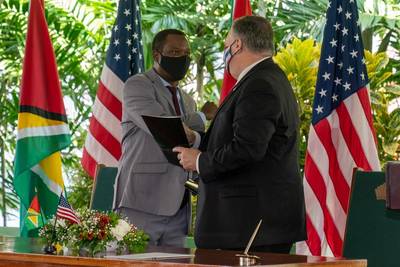US, Guyana to Launch Joint Maritime Patrols Near Venezuela
The United States and Guyana will begin joint maritime patrols aimed at drug interdiction near the South American country’s disputed border with crisis-stricken Venezuela, the U.S. secretary of state and Guyana’s new president said on Friday.
The agreement comes as U.S. oil major Exxon Mobil Corp, as part of a consortium with Hess Corp and China’s CNOOC Ltd, ramps up crude output from Guyana’s massive offshore Stabroek block, a large portion of which is in waters claimed by Venezuela.
“Greater security, greater capacity to understand your border space, what’s happening inside your Exclusive Economic Zone - those are all things that give Guyana sovereignty,” U.S. Secretary of State Mike Pompeo said in a joint appearance with newly-installed Guyanese President Irfaan Ali.
Pompeo is using his four-nation South America tour to ramp up pressure on Venezuelan President Nicolas Maduro, who has overseen a six-year economic collapse and has been indicted in the United States on narcoterrorism charges, to resign.
“We know that the Maduro regime has decimated the people of Venezuela and that Maduro himself is an indicted narcotics trafficker. That means he has to leave,” Pompeo told reporters during his appearance in Georgetown with Ali.
Venezuela’s information ministry did not immediately respond to a request for comment. Maduro, who accuses the United States of seeking to provoke a coup and seize control of the OPEC nation’s vast oil reserves, remains in power despite the 18-month campaign of economic sanctions and diplomatic pressure led by Washington.
The latest salvo in a century-long border dispute between Guyana and Venezuela that is currently being evaluated at the International Court of Justice came in late 2018, when Venezuela’s navy intercepted a vessel conducting a seismic survey on Exxon’s behalf.
A series of offshore oil discoveries in recent years have given Guyana, which has no history of oil production, the potential to become one of Latin America’s largest producers.
“We have had various difficulties and I think we welcome any help that would enhance our security, that would enhance our ability to protect our borders,” Ali said.
(Reporting by Neil Marks; Writing by Luc Cohen; Editing by Daniel Wallis)














